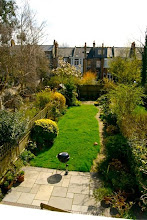
The timing of next week’s Valentine Day may seem particularly cruel, if you are feeling loveless and forlorn on Saturday night, when others have true love and roses. It is at moments such as these that one needs a kindred spirit; and Edith Wharton has always seemed to me to provide that companionship, however bleak her stories of love and loss.
Her fiction is filled with characters that have their hopes crushed, and passions betrayed – and parallels are therefore often drawn with Wharton’s own life (an unhappy marriage to an unstable man, followed by a love affair with a bisexual, faithless bounder). Yet for all the unhappiness she suffered, interspersed with episodes of ill health, Wharton escaped from her claustrophobic past, prospering as a thoroughly independent, brilliantly successful writer. And nowhere is her brilliance more dazzling than in ‘After Holbein’, published in 1928, which tells the story of an aging New York socialite named Anson Warley. He is the type of man who would never spend a Saturday evening alone – or indeed any other night of the week – and prides himself on his unshakeable social status. “It was still a privilege, a distinction, to have him to dine”; and those who sought him at their tables “had to offer very special inducements in the way of cuisine, conversation, or beauty. Young beauty; yes, that would do it. He did like to sit and watch a lovely face, and call laughter into lovely eyes.”
But on the wintry night of the story, Anson Warley forgets where he is supposed to be dining, and ends up at the mansion of Evelina Jaspar, an elderly lady ‘who was gently dying of softening of the brain [but] still imagined herself to be New York’s leading hostess… and still came down every evening to her great shrouded drawing-rooms, with her tiara askew on her purple wig”.
‘After Holbein’ suggests that youth and beauty fade, and social hierarchy crumbles; that in the end, we are alone, united only by inescapable death. It might seem a bit sombre a message for Valentine’s Day, but there’s something to be said for Wharton’s icily cold blast of fresh air, to dilute the pervasive fug of perfumed romances.









11 comments:
'But on the wintry night of the story, Anson Warley forgets where he is supposed to be dining, and ends up at the mansion of Evelina Jaspar, an elderly lady ‘who was gently dying of softening of the brain [but] still imagined herself to be New York’s leading hostess… and still came down every evening to her great shrouded drawing-rooms, with her tiara askew on her purple wig”.'
That paragraph reminded me of when Anne Shirley (formerly of Green Gables) is living at Windy Willows (if I remember correctly) and she goes to have dinner with this magnificent old lady who still thinks she's the cream of society and her family still rule the social hierarchy and she tells Anne her lurid family history about past glories and such... but its all in the past. She is merely an old lady living in solitary splendour...
Sorry for rambling but that paragraph just brought that all back... that old woman terrified me! :)
I love Edith Wharton's novels, particularly because of her uncompromising view on life. I completely fell in love with 'The Age of Innocence' and 'The House of Mirth' whilst at University. Not to mention wanting to give her mother a huge slap!
She really is a good person to read in the lead up to the most sacharine of days!
Your comment about when V day falls this year reminds me of a song by Fascinating Aida, in which there is a line 'Saturday night was made for lovers, Saturday night you should spend with a friend. All I really do on Saturday night is wait for it to end!'
On an unrelated note, hope you've not been too affected by the snow!
Jemima: I like the sound of that. I loved Anne of Green Gables, but is this a sequel? It's also quite reminiscent of Miss Havisham.
Oxford Reader: I concur completely with those sentiments right now!
The book Jemima refers to is "Anne of Windy Poplars," the fourth in the Anne series (according to Wikipedia, the UK edition is called "Anne of Windy Willows).
I first read The Age of Innocence when I was about thirteen, when the film came out, and it was not until some years later that I realized how heartbreaking it really is. I've never read 'After Holbein;" I must dig it up somewhere.
There is a whole array of Anne of... sequels! You'll be spoilt for choice!
My favourites are 'Anne of the Island' and 'Anne's House of Dreams' ... I must have read them a hundred times when I was young!
I've read them hundreds of times as well. they're brilliant. Plus I read the other sequels Rainbow Valley and Rilla of Ingleside... they're rather wonderful as well.
By sheer coincidence I have been reading your columns but not posting and have just bought Hermione Lee's biography of Edith Wharton in a book sale in Melbourne last week. I was just about to start it tonight having almost finished the first of Stieg Larrson's Millenium trilogy, The Girl with the Dragon Tattoo" which I found unputdownable. A bit of a contrast, but I love biographies, especially of this era. Will let you know what it's like.
BTW I started reading your blog because I bought Daphne last year and loved it. As ex-poms we come back to the UK regularly and my husband's cousin lives in Polruan and she has taken us around the various places related to Du Maurier. I always love taking the car across on the ferry and gazing at the family house at Ferryside. I was born in Huddersfield and have always felt a strong affinity for Yorkshire and the Brontes and have been to Haworth several times so funny how the two aspects came together for me in Daphne!
Jean, thanks for posting your messages on the blog, and I'm so glad to hear that you enjoyed 'Daphne', particularly as you are familiar with the landscape of the novel. I'm looking forward to seeing Fowey again this May, at the du Maurier festival, and also Haworth in June for the Bronte Society festival.
I've been reading Hermione Lee's biography of Edith Wharton, too, and very much enjoying it. But I'm now longing to catch up with the sequels to Anne of Green Gables, following the recommendations of Jemima, Kairu and Oxford Reader. Thank you all so much!
I too grew up with the 'Anne' books and read every one (but preferred the 'Emily' trilogy). But then there are the 'Pat' books and 'The Story Girl' ones and then the one-offs - 'Marigold', 'Kilmeny', ' Jane' ... but my FAVOURITE of all the LMM books is 'The Blue Castle' - it was my mother's favourite too. But I was horrified, Justine, to learn on your blog that LM supposedly killed herself. I knew she was unhappily married (I had read her letters to her friend George MacMillan) but she didn't reveal much there or anywhere from what I understand. Perhaps she didn't wish to be pitied. Recently I had picked up 'Anne of Ingleside' to give to my eight year old daughter to read, which was written only a few years before LM died. I read the chapter on 'Peter Kirk's funeral' again (you see I am still reading and rereading her books) ... in it was the lovely, laughing bride, the miscarriage, the falling away of dreams, the hatred ... I wondered ...
Sorry to go on here, but the LM books are dear to my heart!
Post a Comment